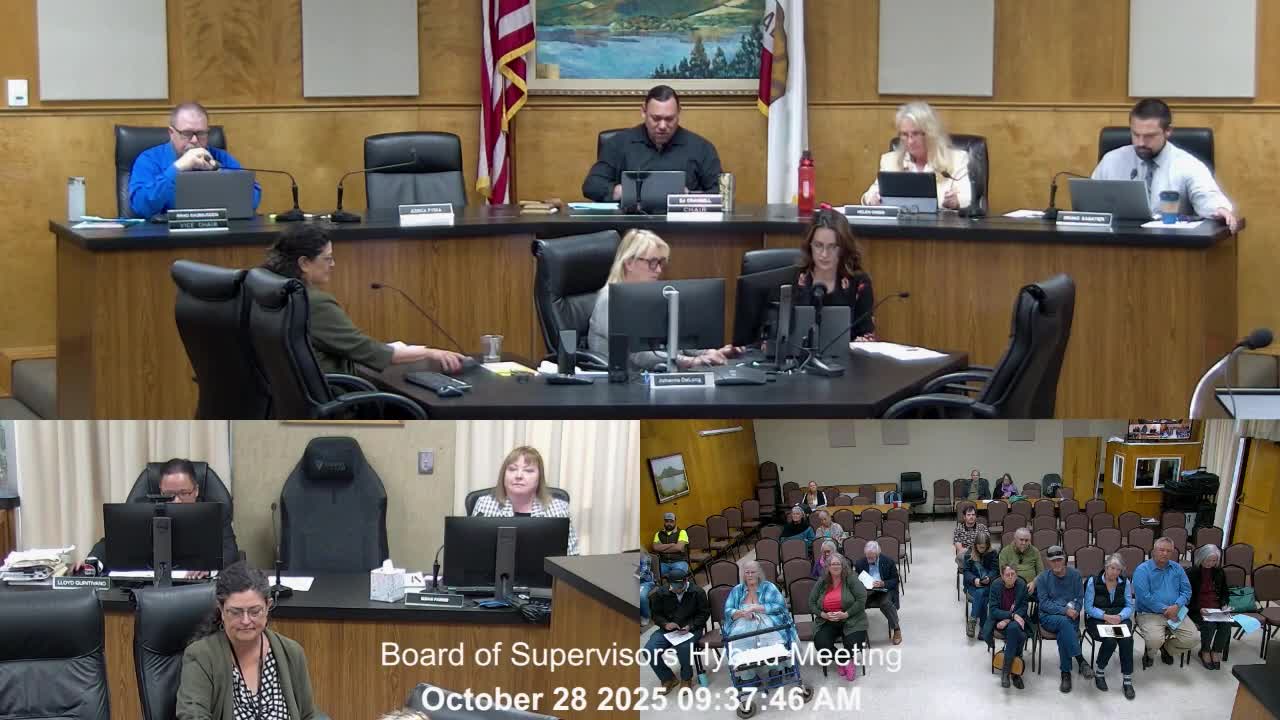Board delays decision on bioenergy project after state raises grant easement concerns
Get AI-powered insights, summaries, and transcripts
Subscribe
Summary
The Lake County Board of Supervisors continued a public hearing on the Ag/Forest Wood Processing Bioenergy Project to Dec. 16 after state reviewers flagged unanswered questions about required conservation easements and permit timing that could jeopardize grant funding for the county27s Middle Creek project.
The Lake County Board of Supervisors on Oct. 28 voted to continue consideration of an appeal of the Planning Commission27s approval of a proposed bioenergy facility on a parcel acquired for the Middle Creek flood‑damage reduction and ecosystem restoration project.
The board moved the public hearing to Dec. 16 at 10:30 a.m. to allow staff and county counsel more time to resolve questions raised by the California Department of Water Resources tied to grant conditions on the parcel. The motion carried 3-1.
Why this matters: County staff and counsel told the board that state reviewers expect a conservation easement or similar title restriction to be recorded on property bought with state funds and that failing to meet those requirements could threaten current and future DWR funding and might require returning money with interest. County Water Resources Director Pawan Apadhyay told the board the state had asked whether the conservation easement must be recorded when each parcel is purchased or later in the assembly of parcels, and he said the timing remains unclear.
What staff said: Community Development Director Maria Turner told supervisors the county had sought clarity from the state and that state staff had replied with additional questions instead of a definitive yes or no. Turner asked for a continuance to continue dialogue with the state and to allow county counsel and staff to research the legal obligations tied to the grant agreement.
County counsel27s view: County counsel advised the board that the grant agreement language requires an 22appropriate easement or other title restriction providing for floodplain preservation and agricultural and/or wildlife habitat conservation22 and that, read across the contract, the state expects an easement to be conveyed. Counsel warned that if the easement were not recorded and the property was used for an incompatible purpose, the county could face significant financial risk.
Appellant and public testimony: Appellant Larry Khan, who has sought to block siting the facility on the parcel, told the board he preferred more time for review, saying there remained conflicting information and unanswered questions about how the property was acquired and whether proper procedures were followed.
Board action: After public comment and a legal briefing, a supervisor moved to continue the hearing to Dec. 16 to give county counsel and staff time to investigate contractual obligations and seek further clarification from DWR. The motion passed 3-1; one supervisor voted against the continuance.
What happens next: Staff and counsel were instructed to pursue the outstanding questions with the Department of Water Resources and to provide the board a more complete legal and factual briefing at the Dec. 16 session. The board also directed staff to ensure county counsel has adequate time to review the pertinent grant and acquisition documents.
Provenance: Statements summarized above are documented in the board27s Oct. 28 public hearing transcript, including remarks by Maria Turner and Pawan Apadhyay and the county counsel27s analysis of the DWR grant language.
